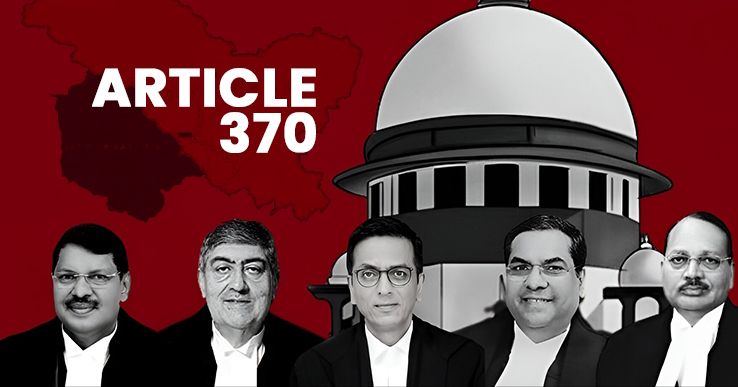The Supreme Court of India’s monumental verdict has overthrown the divisive stronghold of Article 370, which was being used as a vehicle of oppression, separatism, and inequality in Jammu and Kashmir. Article 370 not only functioned as an incubator for influential people and the elites, but it also nurtured fraudulent conduct, manipulation, and propaganda. It was even used by a select few to manipulate power, and wealth and abuse the people of the region.
Eventually, Article 370 ended up being an apparatus for exploitation in the hands of the political elites, bureaucrats, and vested interests in administration, business, and the Bar Association, who continued to use it for their interests while incarcerating ordinary Kashmiris in poverty and injustice. Being used as a safety net for financial exploitation, it protected certain classes from national tax regulations, which led to an open accumulation of wealth.
Under the table, along with the politicians, certain families of the business class manipulated the lack of financial laws in J&K to rack up riches, dismissing all concerns for environmental and societal effects. For instance, before the abrogation of Article 370 on August 5, 2019, laws such as wealth tax, urban land ceiling regulations, gift tax, and various other Union laws didn’t extend their jurisdiction to Jammu and Kashmir.
Also Read: SC upholds constitutional validity of abrogation of Article 370, Reorganisation Act of J&K
The vested interest groups manipulated Jammu and Kashmir’s economy and environment for personal gain on the quiet, using Article 370 as a shield. In particular, during Sheikh Mohammad Abdullah’s tenure, sections of a vital greenbelt overlooking Dal Lake were tactfully acquired by an influential businessman. The land acquisition was done with the subliminal expectation that permission for a hotel construction would eventually be granted. Following Dr. Farooq Abdullah’s assumption of power, further approvals were obtained from the Srinagar Municipal Corporation. Thereafter began the businessman’s search for a well-funded non-local hotelier to whom he could sell the land, complete with the approved building plan.
When Governor Jagmohan reviewed the paperwork during Governor’s Rule in 1986, he noticed discrepancies in land ownership and licenses. Due to the discrepancies, Governor Jagmohan revoked the construction order. However, once the governor’s tenure concluded, the construction of the hotel resumed. Dr. Farooq Abdullah laid the foundation stone for the hotel complex at long last. The pattern continued, and the construction of the hotel was merely a single instance of how the traditional mainstream leadership facilitated specific local businessmen to amass substantial financial gains, prioritizing their interests at the expense of the state’s welfare and causing significant environmental harm.
While across the world, India rejected the “two nation theory,” believing that religion shouldn’t be a reason for segregation or differentiation, the truth is that Article 370 sustained a version of this theory in Jammu and Kashmir until August 5, 2019. The manipulation of Article 370 laid the foundation for a quasi-Pakistan and the proliferation of Islamic fundamentalism, all of which was funded by Indian taxpayers.
The relationship between Jammu and Kashmir and India appeared transactional, primarily serving financial ends and the agendas of political elites, Pakistan’s ISI, terrorists, and separatist networks. Instead of promoting a sustainable, equitable, and progressive relationship, this arrangement exacerbated division and stymied the growth of a secular, just, and durable association between the regions.
Emaad Makhdoomi is the Principal Correspondent of J&K and Ladakh at The New Indian. He is the Former Consulting Editor of J&K’s leading daily Greater Kashmir. His Twitter handle is @MakhdoomiEmaad










